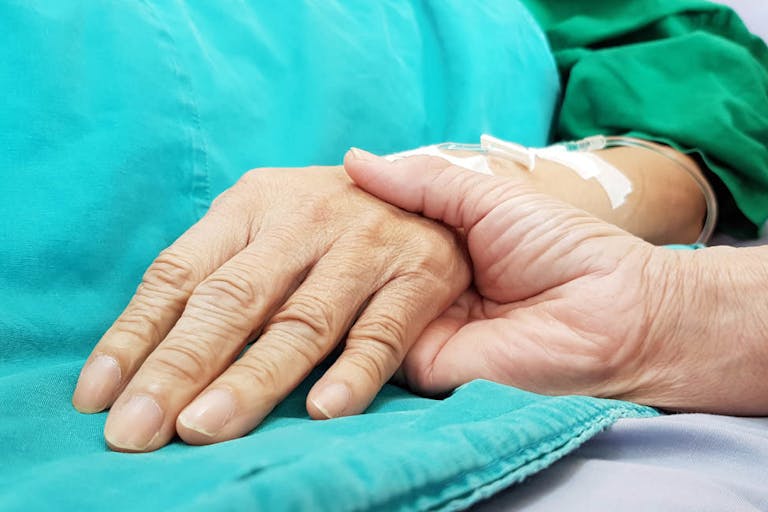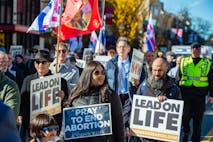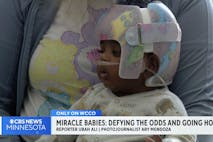
Woman who planned to die by ‘suicide pod’ has gone missing
Nancy Flanders
·
Euthanasia activists escorted a disabled elderly woman to her death
Even in the mind of the most stringent euthanasia activist, the last moments should be spent with those who love and support you. But for one Italian woman, it was two euthanasia activists who escorted her to Switzerland to obtain her death by assisted suicide.
According to a statement via ANSA, 89-year-old Paola R. “had contacted the Luca Coscioni Association, died in the Dignitas Clinic in Switzerland, carrying out assisted suicide.” Paola had been suffering from a rare and particularly difficult form of Parkinson’s disease, and wanted to end her life.
According to a press release from the Luca Coscioni Association, which was instrumental in her death, Paola claimed that her quality of life had diminished and she felt she had no other choice.
“This decision ripened over time, from an initial illness in 2012 that was clearly diagnosed in 2015. A gradual and slow development towards total immobility. Now I am awake/alert in a body that has become a cage without space or hope,” she said. “The diagnosis was an irreversible and ferocious Parkinson’s – tauopathy – which today is at a stage that no longer allows me to live. I am autonomous in nothing except in thought.”
Currently, euthanasia is not legal in Italy, although according to La Repubblica, a 2019 ruling of the Constitutional court stated that under circumstances, euthanasia activists could not be punished for helping with the suicide of “a patient kept alive by life support and suffering from a terminal disease, a source of physical and psychological suffering that the patient considers intolerable,” but nonetheless, is “fully capable of making free and conscious decisions.”
Euthanasia activists hoped the 2019 ruling would free the legislature to make a positive ruling on euthanasia, but the majority-Catholic country has opposed legalizing the practice from both religious and professional organizations, and no further action has occurred on the topic since the decision. In 2019, the Italian Catholic bishops’ conference condemned the court’s ruling, with Bishop Stefano Russo stating that it created “the preconditions for a culture of death, in which society loses the light of reason,” according to CNA.
The Catechism of the Catholic Church states that any form of suicide is immoral. “Suicide contradicts the natural inclination of the human being to preserve and perpetuate his life,” the statement said. “It is gravely contrary to the just love of self. It likewise offends love of neighbor because it unjustly breaks the ties of solidarity with family, nation, and other human societies to which we continue to have obligations.”
The two activists who accompanied Paola, Felicetta Maltese and Virginia Fiume, are known euthanasia activists. In fact, Felicetta was no stranger to helping others die, as she had previously escorted another individual to Switzerland to commit suicide. Paola was not on any kind of life support, and was thus outside the scope of the court decision.
The two later reported themselves to the authorities, using Paola’s death as their own “act of civil disobedience,” and lyrically praising her laying down her life for a political movement, calling assisted suicide a “fundamental human right,” and Paola’s death a sacrifice for Italy:
Every minute spent with Signora Paola was a hymn to life and liberty of the body and the mind. Accompanying her on this journey and choosing to report ourselves [to the authorities] means putting our energy, our body and our freedom at the service of helping people who cannot do it alone and protecting a fundamental human right, but above all being an instrument and a part of a greater struggle […] their love for life and their determination at the service of Italy, not for themselves but to secure laws and rights for all.
In February of 2022, in response to a referendum on assisted suicide, Pope Francis strongly condemned the practice and spoke out in support of palliative care instead.
“After having done everything that is humanly possible to cure the sick, it is immoral to engage in overzealous treatment,” he said in a Wednesday general audience. “We must accompany people towards death, but not provoke death or facilitate any form of suicide. Remember that the right to care and treatment for all must always be prioritized, so that the weakest, particularly the elderly and the sick, are never rejected. Life is a right, not death, which must be welcomed, not administered. And this ethical principle concerns everyone, not just Christians or believers.”
Live Action News is pro-life news and commentary from a pro-life perspective.
Contact editor@liveaction.org for questions, corrections, or if you are seeking permission to reprint any Live Action News content.
Guest Articles: To submit a guest article to Live Action News, email editor@liveaction.org with an attached Word document of 800-1000 words. Please also attach any photos relevant to your submission if applicable. If your submission is accepted for publication, you will be notified within three weeks. Guest articles are not compensated (see our Open License Agreement). Thank you for your interest in Live Action News!

Nancy Flanders
·
Issues
Angeline Tan
·
Activism
Cassy Cooke
·
Politics
Bridget Sielicki
·
Issues
Nancy Flanders
·
Issues
Bridget Sielicki
·
Human Interest
Laura Nicole
·
Human Interest
Laura Nicole
·
Newsbreak
Laura Nicole
·
Human Interest
Laura Nicole
·
Human Interest
Laura Nicole
·